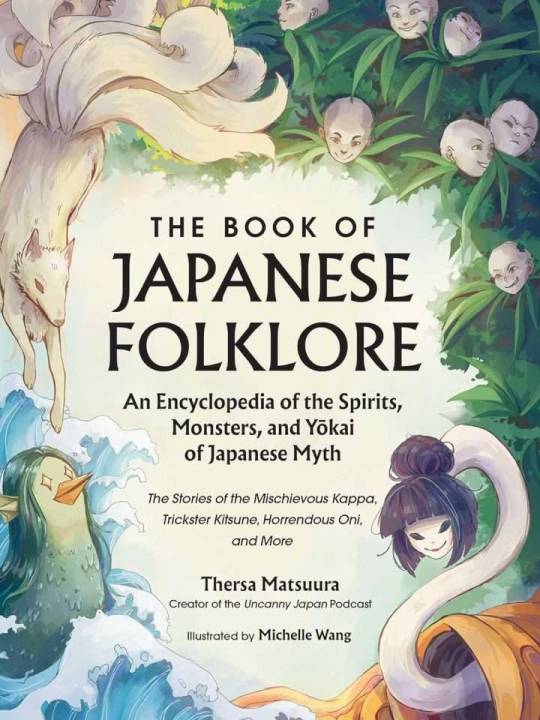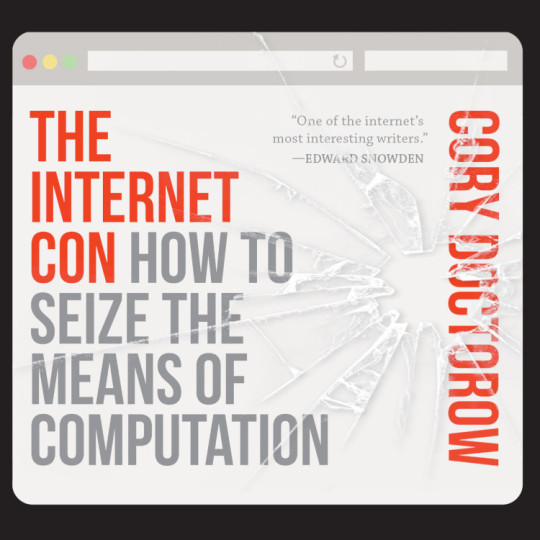#simon&schuster
Explore tagged Tumblr posts
Text
"Book of Japanese Folklore" By Matsuura Inspires: Review

Today, I'm happy to review The Book of Japanese Folklore, a book published by Adams Media. I review a lot of books and other media on here, most of it on roleplaying game materials. But it's so important to review the source material for the lore behind some of the most major inspirations for these games, as well. The book is written by Thersa Matsuura and illustrated by Michelle Wang. Let's take a look at what this literature has to offer!

The cover of The Book of Japanese Folklore, written by Thersa Matsuura and illustrated by Michelle Wang. Published by Adams Media.
Our Review of The Book of Japanese Folklore
At first read-through, I am happy to see a ton of captivating illustrations blessing this wonderful book of Japanese folklore. As it stands, some of the illustrations, again created by the talented artist Michelle Wang, are strikingly bright. Others, such as the illustrated page for the fabled Ōkami, a wolf Yokai, are gloomy, but that's how they should be. Reading the contents of this book, I have but a few concerns. The back cover offers many things that the content between the covers delivers. However, I would have loved a bit more specificity about where certain folklore characters are seen in popular culture. For example, the mythological wizard Abe no Seimei has some pop culture precedent, but The Book of Japanese Folklore doesn't actually say where. Therefore, readers looking for a source of inspiration from which to derive their own story of Abe no Seimei may be disappointed. Granted, this isn't always the case - for example, Hitotsume-kozō has a fine entry in this regard - but it wouldn't hurt for a bit more specificity here at times. Furthermore, I hope there is a second Japanese Folklore entry in this specific series because Japanese myths are so widespread. I was surprised not to see Gashadokuro in this book, for example. There are obviously a few other folkloric figures I'd like to read more about, so I'm just hoping that Matsuura will be allowed to showcase her expertise again with a sequel. https://www.youtube.com/watch?v=AdZ0ygl3AYE But that's where my gripes end. The Book of Japanese Folklore is very eye-opening and teaches a ton about the mythologies, spirits, and monsters of folkloric Japan. I was surprised to learn anything new about the Kappa. I knew of this creature as a turtle-shelled monkey-like creature with a beak and a bowled skull. I did not, however, know that the earliest mention of the Kappa was regarding a water snake known as the Mizuchi (I had a few nitpicks about this entry in its section on pop culture, namely how it missed Golduck when explaining similar-looking Pokémon, but I will leave that for another day.) If you are looking for a good resource on Japanese folklore and mythology, I highly recommend picking up The Book of Japanese Folklore by Thersa Matsuura. you can find it on Simon & Schuster's website at a price of $16.99 USD. Read the full article
#adamsmedia#books#folklore#japan#MichelleWang#mythology#review#Simon&Schuster#TheBookofJapaneseFolklore#ThersaMatsuura
0 notes
Text
my father told me he read it, but he hasn't read it. that's okay. my friends keep picking the words out of my throat.
someone once told me that the more trigger warnings that go on a book, the better it is. i didn't mean to write something with so many conditional phrases - i was writing about what i felt while being a human. sometimes you are a person and sometimes you are a statistic. sometimes it is falling upwards and sometimes it's sliding back down again.
my father tells me that it will be difficult to get people to read it. i didn't like the idea of a singular genre. i'm not going to lie to you - it is actually a difficult book to get through. i change the rules in it. it's not poetry or prose explicitly. it's neither false nor reality. i give you the tools to "solve" the book, but i let you do the thinking. my father says people don't care to think. i don't know about that - i think we just, like, enjoy reading.
the thing is - i was tired of stories about survival where someone with depression goes to therapy and wakes up okay. i didn't live like that. i was tired of books about violence, where the gore of what i experience was splashed in glitter to lick off the page. like, i was a person, you know? i had a life and a job and a family. and in books, i watched my story get ripped up so people could explore the viscera of my body. so they could feel good. my brother once called it inspiration pornography. we had walked out of a suicide-prevention seminar, both of us disgusted while the increasingly-elated presenter kept listing methods-of. i remember the look on my brother's face. like i would tear that man apart given the right time and place.
my father says that kids these days. he warns me against writing about things that are too-serious. he says that they don't want it. i don't listen. he does make me take out a scene from the book where i go to church after having sex with a woman. it used to be the 7th scene in the book. i don't think he's read further than that, it rocked him too hard to continue.
it's a book about being queer. it's a book about being raised catholic. it doesn't have monsterfucking, i'm sorry. it's just about, like.
at some point you have to choose to stay here. and then you do have to stay here, which takes practice. this is about forming the habit. this is about what happens after you've already started doing the work. because, like. you keep going. you have to. and it's like. very imperfect.
i should make a post on instagram. i should make this announcement less bittersweet. but like -- i'm giving it you, specifically, because i think you know why i had to write it. you and me. this little community.
body's a bad monster. here's the link if you're interested in ordering.
#i will never shut up about this#by the way . this is the book that u are trying to get me to eat#also available on other links!! barnes and noble and s&S#also btw i drew the cover :) they asked me to lol#btw this isn't self-published. this is like. book deal thru simon and schuster
2K notes
·
View notes
Text

Sophie's Bedroom
A commission for Simon & Schuster and Shannon Messenger from a couple years ago.
#kotlc#sophie foster#illustration#keeper of the lost cities#commission#simon & schuster#artists on tumblr
500 notes
·
View notes
Text

UK 1998
#UK1998#SIMON & SCHUSTER INTERACTIVE#ZABLAC ENTERTAINMENT#THE DIGITAL VILLAGE#ADVENTURE#LICENSED#IBM#MACINTOSH#STARSHIP TITANIC
87 notes
·
View notes
Text
The Kobayashi Alternative (or the 1000 deaths of James T. Kirk)
Finished this game (a text adventure) recently, and oh God, what a glorious mess it was!
The frame story (which only appears in the manual, by the way) places you as a Starfleet Academy cadet, playing a simulation of one of Kirk's famous missions, as a sort of alternative to the infamous Kobayashi Maru test (hence the title). But the actual game revolves around Kirk's mission, trying to find Sulu, who has disappeared in the Trianguli sector. And you're given complete freedom to explore the area and planets in whatever order you choose, and to mess the game in whatever way you want.
And that's my main point of interest here. I've witnessed so, SO many deaths for poor Kirk, because of my ill-advised decisions... Falling into craters, being run over by lava from a (not-so-extinct) volcano, sinking in quicksand, being eaten by a dragon, falling into a moat (and then being eaten), beaming down to a planet with a temperature of -250° in just my uniform (because why not?), or the more gruesome version of beaming down to a no-atmosphere planet without a spacesuit. It's also possible to return to Earth without finishing the mission, just like that, which gets you court-martialed. Or beam down some unsuspecting redshirt to a dangerous area, and to his unavoidable death (which here causes a Game-Over, very much unlike the series). Want to swear at someone until the crew arrests you for bad conduct? Check. *For the record, these are the swear words I found to work: bitch, bastard, suck, c*ck, f*ck, ass (use them in any combination you see fit). There's also many crazy things to do, which don't necessarily lead to a game over. Leave poor Scotty stranded on a planet and depart without him (good luck when you need something from Engineering). Or make Spock mindmeld with clay. Or tell McCoy to enter Spock's quarters, and just leave him there for the rest of the game. There's a planet with aliens that are offended by clothes and will put you in jail for wearing them (well, this is inaccurate, because James Tits-Out Kirk would definitely beam down naked, if it would help the mission... and make sure to video-call Spock right before doing so).
Anyway, despite being a primitive game from 1985, I'm impressed by the sheer amount of possibilities and open-ended options in this game. The graphic adventures from the 90's (25th Anniversary, and specially Judgement Rites) are much, much better games overall. But I wanted to talk a bit about these, more obscure text adventures.
If anyone's interested in playing them, I've found the best way is through this custom installer here, which includes all three adventures: https://collectionchamber.blogspot.com/p/star-trek-first-contact.html It automatically runs the games through an emulator for modern systems, and has the last version of Kobayashi Alternative (which is very important, since previous versions were buggy as hell). First Contact uses the same engine of Kobayashi, but since it's a much linear and smaller game, it's obvious a lot of options go un-used. The Promethean Prophecy is a more traditional text adventure. It has some ingenious puzzles, but I found its typical plot of "go there and collect gems" less Trek-like.
#star trek tos#star trek videogames#text adventures#the kobayashi alternative#james t kirk#simon & schuster#abandonware#diane duane
640 notes
·
View notes
Text

Stephen Graham Jones (My Heart is a Chainsaw, The Only Good Indians) will publish The Buffalo Hunter Hunter on Match 18 via Saga Press.
Set in the American west of 1912, the 496-page horror novel follows a Lutheran priest who transcribes the life of a vampire who haunts the fields of the Blackfeet reservation looking for justice.
A diary, written in 1912 by a Lutheran pastor is discovered within a wall. What it unveils is a slow massacre, a chain of events that go back to 217 Blackfeet dead in the snow. Told in transcribed interviews by a Blackfeet named Good Stab, who shares the narrative of his peculiar life over a series of confessional visits. This is an American Indian revenge story written by one of the new masters of horror, Stephen Graham Jones.
Pre-order The Buffalo Hunter Hunter by Stephen Graham Jones.
#stephen graham jones#the buffalo hunter hunter#my heart is a chainsaw#the only good indians#horror books#book#gift#saga press#simon and schuster#don't fear the reaper#the angel of indian lake#jade daniels
94 notes
·
View notes
Text

🩷🐦💙
“May Light always surround you; Hope Kindle and rebound you. May your Hurts turn to healing; Your Heart embrace feeling. May Wounds become wisdom; Every Kindness a prism. May Laughter infect you; Your Passion resurrect you. May Goodness inspire your Deepest desires. Through all that you reach for, May your arms never tire.”
~ D. Simone
Digital Art: Enduring Grace, Inge Schuster
#digital art#inge schuster#woman#bird#light#d. simone#quotes#inspirational quotes#blue night#tree branches
48 notes
·
View notes
Note
Best books on Trump?
Confidence Man: The Making of Donald Trump and the Breaking of America by Maggie Haberman (BOOK | KINDLE | AUDIO) Nobody is more plugged-in to Trump's world than Maggie Haberman, and she has been since he first announced he was running for President in 2015. She was one of the rare journalists who took him seriously from the beginning, and it gave her the unique access which results in some remarkable stories. Trump can't help but open up to her, even though he constantly attacks her for her coverage and has said some reprehensible things about her. I can't imagine how exhausted she is of being the Trump expert after almost ten years, and it isn't ending anytime soon.
The Divider: Trump in the White House, 2017-2021 by Peter Baker and Susan Glasser (BOOK | KINDLE | AUDIO) Peter Baker has covered the Presidency for over two decades and written excellent books about the past five Presidents. He continues to cover the White House for the New York Times and his frequent pieces analyzing contemporary Presidents in relation to Presidential history are always great. Susan Glasser is a longtime reporter for The New Yorker and is also fantastic with her coverage and has written several good books of her own. From time-to-time, Baker and Glasser, who have been married for years, team up to write a book and The Divider, like their incredible book about James Baker (The Man Who Ran Washington) shows how deep their connections are in Washington and American politics.
The Trump Tapes: Bob Woodward's Twenty Interviews with President Donald Trump by Bob Woodward (BOOK | KINDLE | AUDIO) Bob Woodward has written several books about Donald Trump's Presidency, and even before releasing this collection of twenty complete interviews with Trump, the legendary reporter who helped bring down Richard Nixon came to the conclusion that Trump was far more dangerous than Nixon and an undeniable threat to American democracy and the world order. Each of Woodward's other four books about or partially-focused on Trump (which are titled Fear, Rage, Peril, and War respectively -- which is not only appropriate, but might as well have been Trump's campaign slogan) are must-reads. But The Trump Tapes gives you Trump in his own, erratic, redundant, uncensored words full of lies and threats and insanity. It should frighten and repel people, but this is America where ignorance and intolerance openly reign, so instead this fucking country put Trump back in power, but with a mandate and full Congressional control this time. Ugh.
#Books#Book Suggestions#Book Recommendations#Books about Presidents#Presidential Biographies#History#Presidents#Presidential History#Politics#Presidency#Presidential Politics#Donald Trump#President Trump#Trump Administration#President-elect Trump#Maggie Haberman#Confidence Man: The Making of Donald Trump and the Breaking of America#Penguin Press#Penguin Random House#Peter Baker#Susan Glasser#The Divider: Trump in the White House#Doubleday#Confidence Man#The Divider#Bob Woodward#The Trump Tapes#The Trump Tapes: Bob Woodward's Twenty Interviews with President Donald Trump#Simon & Schuster#Rage
22 notes
·
View notes
Text

The Manual of Male Photography - Michael Busselle - Simon & Schuster 1985
25 notes
·
View notes
Text
Private equity plunderers want to buy Simon & Schuster

Going to Defcon this weekend? I'm giving a keynote, "An Audacious Plan to Halt the Internet's Enshittification and Throw it Into Reverse," on Saturday at 12:30pm, followed by a book signing at the No Starch Press booth at 2:30pm!
https://info.defcon.org/event/?id=50826

Last November, publishing got some excellent news: the planned merger of Penguin Random House (the largest publisher in the history of human civilization) with its immediate competitor Simon & Schuster would not be permitted, thanks to the DOJ's deftly argued case against the deal:
https://pluralistic.net/2022/11/07/random-penguins/#if-you-wanted-to-get-there-i-wouldnt-start-from-here
When I was a baby writer, there were dozens of large NY publishers. Today, there are five - and it was almost four. A publishing sector with five giant companies is bad news for writers (as Stephen King said at the trial, the idea that PRH and S&S would bid against each other for books was as absurd as the idea that he and his wife would bid against each other for their next family home).
But it's also bad news for publishing workers, a historically exploited and undervalued workforce whose labor conditions have only declined as the number of employers in the sector dwindled, leading to mass resignations:
https://lithub.com/unlivable-and-untenable-molly-mcghee-on-the-punishing-life-of-junior-publishing-employees/
It should go without saying that workers in sectors with few employers get worse deals from their bosses (see, e.g., the writers' strike and actors' strike). And yup, right on time, PRH, a wildly profitable publisher, fired a bunch of its most senior (and therefore hardest to push around) workers:
https://www.nytimes.com/2023/07/18/books/penguin-random-house-layoffs-buyouts.html
But publishing's contraction into a five-company cartel didn't occur in a vacuum. It was a normal response to monopolization elsewhere in its supply chain. First it was bookselling collapsing into two major chains. Then it was distribution going from 300 companies to three. Today, it's Amazon, a monopolist with unlimited access to the capital markets and a track record of treating publishers "the way a cheetah would pursue a sickly gazelle":
https://pluralistic.net/2023/07/31/seize-the-means-of-computation/#the-internet-con
Monopolies are like Pringles (owned by the consumer packaged goods monopolist Procter & Gamble): you can't have just one. As soon as you get a monopoly in one part of the supply chain, every other part of that chain has to monopolize in self-defense.
Think of healthcare. Consolidation in pharma lead to price-gouging, where hospitals were suddenly paying 1,000% more for routine drugs. Hospitals formed regional monopolies and boycotted pharma companies unless they lowered their prices - and then turned around and screwed insurers, jacking up the price of care. Health insurers gobbled each other up in an orgy of mergers and fought the hospitals.
Now the health care system is composed of a series of gigantic, abusive monopolists - pharma, hospitals, medical equipment, pharmacy benefit managers, insurers - and they all conspire to wreck the lives of only two parts of the system who can't fight back: patients and health care workers. Patients pay more for worse care, and medical workers get paid less for worse working conditions.
So while there was no question that a PRH takeover of Simon & Schuster would be bad for writers and readers, it was also clear that S&S - and indeed, all of the Big Five publishers - would be under pressure from the monopolies in their own supply chain. What's more, it was clear that S&S couldn't remain tethered to Paramount, its current owner.
Last week, Paramount announced that it was going to flip S&S to KKR, one of the world's most notorious private equity companies. KKR has a long, long track record of ghastly behavior, and its portfolio currently includes other publishing industry firms, including one rotten monopolist, raising similar concerns to the ones that scuttled the PRH takeover last year:
https://www.nytimes.com/2023/08/07/books/booksupdate/paramount-simon-and-schuster-kkr-sale.html
Let's review a little of KKR's track record, shall we? Most spectacularly, they are known for buying and destroying Toys R Us in a deal that saw them extract $200m from the company, leaving it bankrupt, with lifetime employees getting $0 in severance even as its executives paid themselves tens of millions in "performance bonuses":
https://memex.craphound.com/2018/06/03/private-equity-bosses-took-200m-out-of-toys-r-us-and-crashed-the-company-lifetime-employees-got-0-in-severance/
The pillaging of Toys R Us isn't the worst thing KKR did, but it was the most brazen. KKR lit a beloved national chain on fire and then walked away, hands in pockets, whistling. They didn't even bother to clear their former employees' sensitive personnel records out of the unlocked filing cabinets before they scarpered:
https://memex.craphound.com/2018/09/23/exploring-the-ruins-of-a-toys-r-us-discovering-a-trove-of-sensitive-employee-data/
But as flashy as the Toys R Us caper was, it wasn't the worst. Private equity funds specialize in buying up businesses, loading them with debts, paying themselves, and then leaving them to collapse. They're sometimes called vulture capitalists, but they're really vampire capitalists:
https://www.motherjones.com/politics/2022/05/private-equity-buyout-kkr-houdaille/
Given a choice, PE companies don't want to prey on sick businesses - they preferentially drain off value from thriving ones, preferably ones that we must use, which is why PE - and KKR in particular - loves to buy health care companies.
Heard of the "surprise billing epidemic"? That's where you go to a hospital that's covered by your insurer, only to discover - after the fact - that the emergency room is operated by a separate, PE-backed company that charges you thousands for junk fees. KKR and Blackstone invented this scam, then funneled millions into fighting the No Surprises Act, which more-or-less killed it:
https://pluralistic.net/2020/04/21/all-in-it-together/#doctor-patient-unity
KKR took one of the nation's largest healthcare providers, Envision, hostage to surprise billing, making it dependent on these fraudulent payments. When Congress finally acted to end this scam, KKR was able to take to the nation's editorial pages and damn Congress for recklessly endangering all the patients who relied on it:
https://pluralistic.net/2022/03/14/unhealthy-finances/#steins-law
Like any smart vampire, KKR doesn't drain its victim in one go. They find all kinds of ways to stretch out the blood supply. During the pandemic, KKR was front of the line to get massive bailouts for its health-care holdings, even as it fired health-care workers, increasing the workload and decreasing the pay of the survivors of its indiscriminate cuts:
https://pluralistic.net/2020/04/11/socialized-losses/#socialized-losses
It's not just emergency rooms. KKR bought and looted homes for people with disabilities, slashed wages, cut staff, and then feigned surprise at the deaths, abuse and misery that followed:
https://www.buzzfeednews.com/article/kendalltaggart/kkr-brightspring-disability-private-equity-abuse
Workers' wages went down to $8/hour, and they were given 36 hour shifts, and then KKR threatened to have any worker who walked off the job criminally charged with patient abandonment:
https://pluralistic.net/2023/06/02/plunderers/#farben
For KKR, people with disabilities and patients make great victims - disempowered and atomized, unable to fight back. No surprise, then, that so many of KKR's scams target poor people - another group that struggles to get justice when wronged. KKR took over Dollar General in 2007 and embarked on a nationwide expansion campaign, using abusive preferential distributor contracts and targeting community-owned grocers to trap poor people into buying the most heavily processed, least nutritious, most profitable food available:
https://pluralistic.net/2023/03/27/walmarts-jackals/#cheater-sizes
94.5% of the Paycheck Protection Program - designed to help small businesses keep their workers payrolled during lockdown - went to giant businesses, fraudulently siphoned off by companies like Longview Power, 40% owned by KKR:
https://pluralistic.net/2020/04/20/great-danes/#ppp
KKR also helped engineer a loophole in the Trump tax cuts, convincing Justin Muzinich to carve out taxes for C-Corporations, which let KKR save billions in taxes:
https://pluralistic.net/2020/06/02/broken-windows/#Justin-Muzinich
KKR sinks its fangs in every part of the economy, thanks to the vast fortunes it amassed from its investors, ripped off from its customers, and fraudulently obtained from the public purse. After the pandemic, KKR scooped up hundreds of companies at firesale prices:
https://pluralistic.net/2020/03/30/medtronic-stole-your-ventilator/#blackstone-kkr
Ironically, the investors in KKR funds are also its victims - especially giant public pension funds, whom KKR has systematically defrauded for years:
https://pluralistic.net/2020/07/22/stimpank/#kentucky
And now KKR has come for Simon & Schuster. The buyout was trumpeted to the press as a done deal, but it's far from a fait accompli. Before the deal can close, the FTC will have to bless it. That blessing is far from a foregone conclusion. KKR also owns Overdrive, the monopoly supplier of e-lending software to libraries.
Overdrive has a host of predatory practices, loathed by both libraries and publishers (indeed, much of the publishing sector's outrage at library e-lending is really displaced anger at Overdrive). There's a plausible case that the merger of one of the Big Five publishers with the e-lending monopoly will present competition issues every bit as deal-breaking as the PRH/S&S merger posed.
(Image: Sefa Tekin/Pexels, modified)


I’m kickstarting the audiobook for “The Internet Con: How To Seize the Means of Computation,” a Big Tech disassembly manual to disenshittify the web and bring back the old, good internet. It’s a DRM-free book, which means Audible won’t carry it, so this crowdfunder is essential. Back now to get the audio, Verso hardcover and ebook:
http://seizethemeansofcomputation.org

If you’d like an essay-formatted version of this post to read or share, here’s a link to it on pluralistic.net, my surveillance-free, ad-free, tracker-free blog:
https://pluralistic.net/2023/08/08/vampire-capitalism/#kkr

#kkr#simon and schuster#publishing#penguin random house#ppp loans#looters#plunderers#vampire capitalism#vulture capitalism#debt#private equity#pe#harmful dominance#monopoly#trustbusters#incentives matter#labor#writing#publishing workers#recorded books#overdrive#glam#libraries#toys r us#pluralistic
186 notes
·
View notes
Text

Julian Gloag - Our Mother's House - Simon and Schuster - 1963 (jacket illustration by Milton Glaser)
#witches#mothers#occult#vintage#our mother's house#simon and schuster#julian gloag#novel#1963#milton glaser#mother#house
24 notes
·
View notes
Photo

My Wishlist
#adamsmedia#art#books#coloring#coloringbook#D&D#Dungeonmeister#dungeonsanddragons#fantasy#rpg#Simon&Schuster
0 notes
Text

Pan Am Jet Flight Story Book - 1972.
#dale evans#roy rogers#vintage illustration#simon and schuster#vintage books#books#book illustration#children’s books#pan am#pan american#airlines#air travel#pan american airlines#pan american world airways#pan american airways#luxury air travel#story books
12 notes
·
View notes
Text

Alvin Webster's Surefire Plan for Success (and How It Failed) by Sheila Greenwald
Cover illustration by Judith Sutton
ISBN 0-671-67239-8
10 notes
·
View notes
Text

UK 1998
#UK1998#ZABLAC ENTERTAINMENT#SIMON & SCHUSTER INTERACTIVE#IMERGY#SIMULATION#CREATIVE#LICENSED#STAR TREK#IBM#MACINTOSH#STAR TREK STARSHIP CREATOR
22 notes
·
View notes
Text

June Jordan, (1981), Civil Wars, with a new introduction by the author, Simon and Schuster, New York, NY, 1995 [Wendy's Subway, Brooklyn, NY]
#graphic design#book#cover#book cover#june jordan#alice walker#simon and schuster#wendy's subway#1990s
9 notes
·
View notes